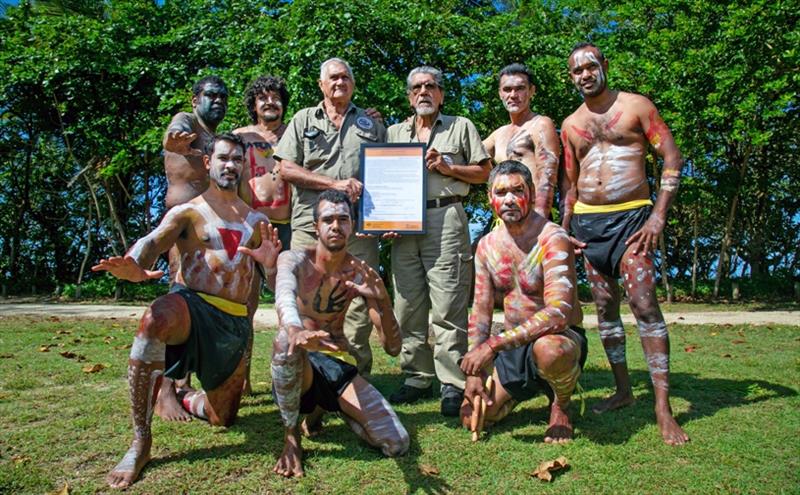
Celebrating a new sea country agreement
by GBRMPA Media 7 Jun 2018 10:04 UTC

Mandubarra - Celebrating a new sea country agreement © GBRMPA Media
A new Traditional Use of Marine Resources Agreement outlining how Mandubarra Traditional Owners will manage their sea country and its resources was launched and celebrated at the weekend.
The agreement between Mandubarra Aboriginal Land and Sea Inc. and the Australian and Queensland governments covers 1500 square kilometres of their sea country in northern Queensland (between Innisfail and Cardwell).
Great Barrier Reef Marine Park Authority general manager Dr Simon Banks said this was a fantastic example of marine park managers and Traditional Owners working together.
"We're delighted to have a formal partnership with the Mandubarra people that recognises their important and ongoing role of managing their sea country and protecting its resources, and acknowledges their cultural authority over the area," he said.
"It is inspiring to see Traditional Owners' valuable cultural practices continue to coexist with the conservation and management of the Reef.
"The Mandubarra people are already active sea country managers who monitor turtle nests, care for sick and injured turtles at their turtle rehabilitation centre, and share knowledge including with the broader community.
"This 10-year agreement supports Traditional Owners to be involved in compliance activities, research, education, youth-focused activities, junior rangers program, and ensures the traditional use of marine resources is ecologically sustainable."
Queensland Parks and Wildlife Service (QPWS) executive director great barrier reef marine coastal and islands Neil Cambourn said the formal agreement acknowledged the work Indigenous and marine park rangers were doing together.
"As well as the Mandubarra's help with the Marine Animal Stranding program, responding to turtle strandings and running a turtle rehabilitation centre, they work with QPWS on projects such as our rat eradication project on the Barnard islands to improve nesting habitat for seabirds," Mr Cambourn said.
"We look forward to the future collaborations between QPWS and the Mandubarra to look after sea country."
Mandubarra Traditional Use of Marine Resources Holder Andrew Appo welcomed the agreement.
"The agreement gives us a sense of trust, as the formal partnership we have developed with government enables us to have input into the management of our sea country," he said.
"We hope the agreement will encourage government to further invest in Mandubarra Traditional Owners to undertake work on country.
"Our ambition is to have Mandubarra Traditional Owners employed as land and sea country rangers working on our own country."
While Mandubarra Traditional Owners can still take dugong and marine turtles if they chose to exercise their rights under S211 of the Native Title Act 1993, through this agreement the Mandubarra Traditional Owners have established a moratorium on take.
Mandubarra Traditional Owners also declared a cultural no-take zone in and around the South Barnard Islands, which means no form of extraction including hunting, spearfishing or take is allowed in these waters.
This no-take area is consistent with the Authority's Green Zone boundary at the South Barnard Islands (Stephens and Sisters Island off Cowely Beach).
Background
- The Mandubarra Traditional Use of Marine Resources Agreement accreditation ceremony was held on Saturday 26 May at Taifalos Park, Kurrimine Beach.
- Traditional Use of Marine Resources Agreements are formal agreements describing how Traditional Owner groups work in partnership with the Australian and Queensland governments to manage traditional use activities on their sea country.
- Traditional Owners voluntarily develop these agreements, which are then accredited by the Marine Park Authority and the Queensland Department of Environment and Science.
- The agreement does not impact on commercial tourism operations or tourism sites, but it does recognise the Mandubarra people's important and ongoing role in managing their sea country.
- The Mandubarra agreement accreditation brings the total number of formal agreements in place to nine and one Indigenous Land Use Agreement covering approximately 25 per cent of the coastline.
These voluntary agreements cover a total of 46,808 square kilometres of sea country along the Great Barrier Reef coast and involve 18 Traditional Owner clan groups.